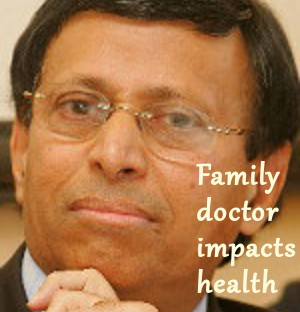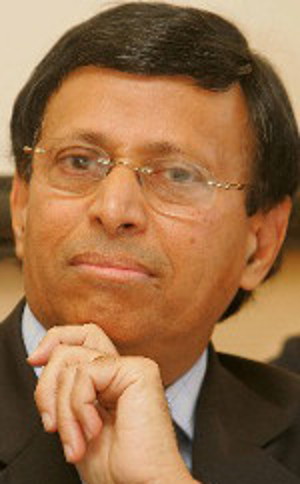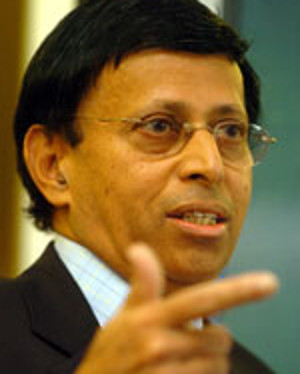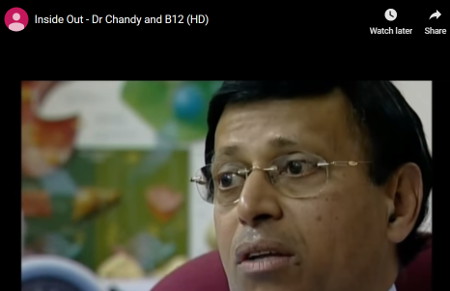
Family doctor improves patient health
(taken from a local English newspaper)
In a crowded East Durham meeting room one patient after another was standing up to tell their story of how a simple course of vitamin injections had changed their lives.
First to speak was Betty Ritson, a patient of Dr. Chandy, a general practitioner who has found previously undiagnosed vitamin B12 deficiency in hundreds of people over the last 25 years.
According to the family doctor, vitamin B12 deficiency may affect up to 12 per cent of the UK population, and is massively under-diagnosed by NHS doctors.
Vitamin B12 plays a vital part in the manufacture of red blood cells and if the vitamin is lacking, the patient may go on to develop one or more of a number of conditions.
Dr. Chandy believes vitamin B12 deficiency must be suspected in all patients with unexplained neuro-psychiatric symptoms or unexplained anaemia.
The GP thinks many patients with B12 deficiency fall through the net because many symptoms are not recognised. These symptoms can range from severe depression to paralysis.
Several patients on Dr. Chandy’s books were diagnosed with multiple sclerosis, an incurable degenerative disease, but have responded well to B12 injections. Others who lost the sight of an eye or collapsed in the street or at home have also been diagnosed with vitamin deficiency and have benefited from the injections.
![]() Vitamin B12 lozenges help you have healthy nerves and blood.
Vitamin B12 lozenges help you have healthy nerves and blood.
Dr. Chandy battles medical establishment
Dr. Chandy has battled for decades to persuade the medical establishment to listen to his views. He has developed a more modern way of diagnosing vitamin deficiency, which replaces an approach which dates back more than 150 years.

The slightly built 60-year-old doctor hopes to persuade Health Secretary Patricia Hewitt that the NHS should adopt his diagnostic approach and improve the health of thousands while saving billions in unnecessary diagnostic procedures and treatment.
A B12 test costs just three pounds, thirty-eight pence while a six-month course of injections costs twenty-eight pounds. (This is an old article. There once were approximately two and a half dollars to a pound. As of late 2021, there’s about $1.35.)
Calling for a break from tradition
Betty Ritson, a feisty patient who was suffering from a range of chronic illnesses until she was diagnosed with vitamin B12 deficiency, said, “If it wasn’t for you, doctor, I wouldn’t be here at all, I would be fertilizing my own flowers.”
The Durham event was organised by Dr Chandy with the backing of The B12 Committee, a support group made up of former patients, to call for a revolutionary break with medical tradition.
Testimonials
Ian Marley, who had complained of a lack of energy and constant tiredness before being diagnosed as B12 deficient, climbed to his feet to blurt out: “I feel on top of the world, happy-go-lucky. I feel absolutely wonderful. So thank you.”
A woman called Jacqueline – rose to her feet. “I had dizzy spells, pins and needles and felt numb down one side. Eventually I keeled over in Peterlee town centre,” she said, adding that her hospital consultant suggested her problems were all in her mind.
But after being diagnosed with B12 deficiency and being given a course of monthly treatments, her problems disappeared. “I feel wonderful after my injections and I know when I need them because my concentration goes and I drop things,” she said.
Another of Dr Chandy’s patients – a woman called Rosemary – told her story, “I was diagnosed as a possible multiple sclerosis case. I used to fall over. I lost the vision in my left eye,” she said.
Like the other patients, she responded well to the B12 injections and was restored to health. “If I didn’t have the injections I wouldn’t be here. You are the best thing since sliced bread,” she said. The cheers and enthusiastic applause which greeted this comment showed the unusual bonds which exist between Dr Chandy and his patients.

750+ given B12 ~ Vast majority benefit
Since the early 1980s, when Dr Chandy first put his views on vitamin B12 deficiency into practice, around 750 patients at his East Durham practice have been given either B12 supplements or injections.
Until recently, NHS hospital specialists have taken a dim view of this maverick GP’s diagnostic approach. But after a review of Dr Chandy’s work, his novel approach to the diagnosis and treatment of B12 deficiency has been cautiously approved by Dr. Jonathan Wallace, consultant haematologist at Newcastle’s Freeman Hospital.
In addition, Dr. Chandy’s ‘pathway of care’ was endorsed by Easington Primary Care Trust in July – although that organisation has been swallowed up by the new County Durham Primary Care Trust which was established last month.
B12 deficiency & illness vs good B12 levels
Dr. Chandy’s conviction that vitamin B12 deficiency could be the cause of many illnesses began when he was a young doctor in India, more than 40 years ago. He wondered whether there could be a link between the ill health of his Hindu patients and their vegetarianism, given that B12 is found in meat, liver, fish, eggs and milk.
But, it is also the case that many people lack the ability to absorb vitamin B12 from their diet, meaning the only way the deficiency can be redressed is by injections or sublingual supplements.
Dr. Chandy discovered that when he gave some of his Hindu patients B12 injections, in most cases their health improved.
All of this was on his mind when he moved to the UK and set up in practice in County Durham in 1970.
As a single-handed GP looking after more than 3,000 patients he didn’t have much spare time, but what time he had he devoted to researching the role played by vitamin B12 in maintaining good health and what might happen if a patient was deficient. He became convinced that the threshold of vitamin B12 deficiency used by NHS doctors to measure this condition was far too low.
B12 level information ~What is a healthy B12 level? ~ Read more.
It took him a decade before he was able to start treating UK patients. His first patient – a woman called Glenys – was in the audience on Monday. “I was in a terrible state, as weak as a kitten,” she said. “I was diagnosed with pernicious anemia. Since then I have been getting the injections for more than 20 years.”
Swallowing B12 tablets doesn’t work
Because of difficulties in getting permission from the NHS to continue with injections, Glenys was denied B12 injections for two years. “They tried tablets but they didn’t work. I needed the injections because I wasn’t taking the vitamins out of my food,” she said.
Her health declined during these two years but since the injections were resumed she says she has enjoyed good health. “I am 60 years old now and there is nothing wrong with me,” she said, proudly.

Many unable to extract B12 from food
Many people are unable to extract vitamin B12 from their food. Vitamin B12 is known to be essential to maintain a healthy nervous system and Dr Chandy suspects this is why a deficiency can cause inflammation of the nerves and dementia.
Dr Chandy’s remarkable story was featured in the BBC television news magazine, Inside Out.

Surreal results from having B12
Catherine Iceton, a 30-year-old mother from Peterlee, told how she was able to stop using a wheelchair and walk normally again, despite being diagnosed with MS, after a course of B12 injections. “It is surreal. I have to pinch myself. I have woken up from my nightmare,” she told cameras.
Another patient featured on the documentary, Jeannette Chapman, 36, from Peterlee, revealed how B12 injections helped her recover from severe depression and allowed her hair to grow back.
On the same BBC video, the Newcastle-based consultant haematologist Jonathan Wallace, who reviewed Dr Chandy’s methods, said it was possible the GP was right after all.
Dr. Chandy may well have the last laugh when his research is published in a leading journal in the near future.
More than anything, the veteran family doctor wants to be able to pass the burden on to other, younger doctors. “I am a tired old man. I can’t fight any longer,” Dr Chandy told his audience of admirers. “It is the truth. I love my patients, this is the reason I have done all this.”
6:01am Friday 3rd November 2006 From: The Northern Echo, United Kingdom, November 2006, My Work is a Labour of Love
In 2014 Dr. Chandy was banned from prescribing Vitamin B12 injections.
Months of public outcry and enthusiastic support from his many happy patients helped to lift the ban, but a higher medical authority (the General Medical Council) later banned him not only from offering vitamin B12 treatments, but from treating chronic fatigue syndrome in any way.
Dr Chandy was born in 1941 in Kerala, India. He studied medicine at the University of Kerala and then moved to the United Kingdom to complete his training as a GP. He started his practice in Horden, County Durham, in 1973 and remained there for the rest of his career.
Dr Chandy became highly recognised for his work on Vitamin B12 deficiency and was a well-known figure in the B12 deficiency community. Along with Hugo Minney, Dr Chandy was the author of “Vitamin B12 deficiency in Clinical Practice” (subtitle “Doctor, you gave me my life back!”)
This book describes Dr Chandy’s findings during his years of clinical practice, As can be seen from the many tributes pouring in on social media sites and forums like www.healthunlocked.com, this publication in 2011 was one of few written materials available which helped people advocate for themselves and improve their diagnosis and treatment of Pernicious Anaemia and B12 deficiency symptoms for other reasons. Many found this book, and the ones written by our Society’s founder Martyn Hooper, the videos by Sally Pacholok and websites like those of Tracey Witty, instrumental in the turning point of their condition.
I personally never encountered Dr Chandy, but I have met and spoken to many who have been impacted either by being a patient of his or from reading his book and starting their own journey of self-discovery to get “their life back”. Without exception these people feel very strongly that Dr Chandy was a hero. I can understand that: the haematologist who first really listened to me and my symptoms and helped get me on the right track sufficiently to start functioning again by going beyond the standard guidelines is my own personal hero.
Dr Chandy was practising in a time and in a community where he was able to see generations of families and his devotion to their care was often noted. He saw people who were suffering symptoms of B12 deficiency which had become familiar to him from Brahmin patients (strict vegetarians). But in the case of his patients in Durham, these were British people with a predominantly meat-based diet. What could be causing these symptoms?
He noticed that testing for B12 and treating low levels showed results in the reversal of symptoms especially fatigue. He saw that many had B12 deficiency even without macrocytosis (the anaemia of pernicious anaemia). He noticed also that folate levels in blood were also affected by B12 deficiency and by B12 injections. Those of us in the know, take this knowledge for granted today, but it is still surprising to me how many in the health care profession are completely unaware of these factors.
Early on in my (pre-charity) working life I was fortunate to work with a boss and mentor who was a quiet leader, someone who stood up for what was right even when faced with insurmountable odds, who used facts, measured arguments, diplomacy, and persuasion to change European law and ultimately to do the right thing. He used to say, “most of us will never be faced with life changing challenges like Mandela, Gandhi, Martin Luther King or Rosa Parks but we can all make a difference to someone, no matter how small”.
I think that Dr Chandy’s beliefs and his stand for improving his patients’ lives will, in time, show that the difference he made was by no means small! Dr Chandy believed that B12 deficiency was much more common than previously thought and could cause a variety of symptoms, even without the typical blood markers. He treated hundreds of his patients with B12 injections, often at higher doses and for longer durations than standard guidelines recommended. He saw improvements in many of his patients, claiming it brought significant relief from fatigue, neurological symptoms, and other issues.
Unfortunately, it seems he was “before his time”, and the medical establishment questioned his approach, citing a lack of strong scientific evidence for B12 deficiency causing many of the conditions he treated, and concerns about potential side effects of high-dose injections. In 2012, the General Medical Council (GMC) temporarily banned Dr Chandy from prescribing B12 and treating fatigue syndrome. The ban was lifted after public outcry from his patients and supporters, arguing for patient autonomy and individualized treatment based on clinical experience. This incident sparked wider debate about the role of patient preferences and practitioner discretion in medical decision-making.
Ironically the British Medical Journal online (BMJ) in December last year, the month that Dr Chandy passed away, carries an article on Vitamin B12 deficiency which specifically advocates many of the points which Dr Chandy and many knowledgeable others have been advocating over the years:
• the clinical picture is the most important factor in assessing the significance of results of blood tests assessing cobalamin (B12) status because there is no “gold standard” test to define deficiency.
• Neurological symptoms resulting from B12 deficiency may take several months or even years to resolve completely.
• Measuring serum biomarkers such as B12 or methylmalonic acid is neither helpful nor indicated in assessing or monitoring clinical improvement, neither is titration of injection frequency based on biomarker assessment.
• Self-administration of intramuscular B12 injections can lead to greater patient satisfaction and better health outcomes.
Vitamin B12 | The BMJ
Whilst the debate continues, both in the comments below this article in the BMJ and in the discussions awaiting the publication of new NICE guidelines on B12 Deficiency in the over 16s, the patient advocacy groups who know from their work that the correct B12 treatment for deficiency is life changing, continue to wonder why there is so little funding for research and so little support from the health care profession for this essential vitamin.
Dr Chandy’s death reminds us that the controversy and debate remains around the standardised guidelines and individual patient needs. It also reminds us that medical practice still needs to evolve and that we are all, patient groups and individuals alike, responsible for helping to advocate for better research and evidence.
Notwithstanding the controversy surrounding his career, in 2013 Dr Chandy was awarded the Glory of India award for his service and work on vitamin B12 deficiency and fatigue. He was also the founder of the B12 deficiency support group (B12d.org), an organisation that recently joined the B12-Alliance, a group of not-for-profits whose mission is to raise awareness and speak with one voice strongly and authoritatively on behalf of the patient backed by sound research and evidence from CluB-12.
Dr Chandy died on 21 December 2023 at the age of 82. Our condolences are with his family and his many supporters.
My aforementioned boss also used to say, “don’t just complain if you don’t like it, do something about it and let’s start now by looking together for a solution” this was always accompanied by his steering me towards the library in search of the relevant “knowledge” to form my arguments. As someone who was awarded an OBE, my boss referred to his recognition as “Other B**gg*ers Efforts” acknowledging the role that we all played in why he received an award. He was a strong supporter of working together for change and left a lasting impression on me as has Dr Chandy’s belief and quiet but firm commitment in his treatment of sufferers.
As the new year starts, let’s all try to use this opportunity to work together to improve the diagnosis and treatment of Pernicious Anaemia and the debilitating symptoms of B12 deficiency.
